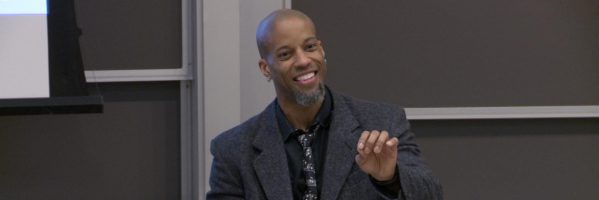Loyola Marymount Makes the ‘A-List’, Scholarships, and More – Los Angeles News

Let’s take a look at some of the biggest news coming out of the Los Angeles business school community from the past week.
Loyola Marymount ‘A-List’ Students Engage in Social Enterprise – LMU Newsroom
Loyola Marymount University’s business students gained exposure to some real world possibilities in social enterprise through a recent event at Vector90, which provides co-working space to underserved entrepreneurs.
The “Rethinking the Marketplace” course is part of the ‘A-List Pathway’ program (Applied Learning in Societal Transformation). Conceived by two LMU marketing professors, Mitch Hamilton and Julian Saint Clair, A-List motivates students to achieve the goals of both growing a business and creating positive change for their communities.
Dr. Saint Clair notes, “Part of LMU’s mission [is] educating the whole person and fighting for social justice.”
Hamilton and Saint Clair contacted developer David Gross and hip-hop artist Nipsey Hussle in coordinating the event at Vector90 earlier this month. The two spoke to students about how they could apply knowledge out of school for ventures such as Vector90. The discussion kicked off a competition for A-List students in which they will submit startup ideas for possible hosting and funding by Vector90.

The open office space of entrepreneurship enterprise Vector90 / Photo via Vector90
Located in the Crenshaw District of Los Angeles, Vector90, which Gross founded, allows members to collaborate with one another and with residents on community improvement projects and creative endeavors. Residents can also attend the center for support and mentorship opportunities.
You can read more about the event and the A-List Pathway here.
Cal State Long Beach Fall Scholarships Now Available – CSU Long Beach AcademicWorks
California State University, Long Beach College of Business Administration has announced its fall scholarships for 2018.
Two specific awards are open to MBA students: the John C. Molina MBA Scholarship (worth up to $3,000) and the Wan-Lin Kiang Endowed Scholarship for up to $1,500. While many of the awards are offered only to undergrads, multiple scholarships are open to any student in the business school.
The Cal State Long Beach scholarship deadline is September 27, 2018. More information on donors can be found here.
Americans Want to Believe Jobs Are the Solution to Poverty. They’re Not. – NY Times
Princeton University sociologist Matthew Desmond’s newest, all-consuming piece for the New York Times, entitled “Americans Want to Believe Jobs Are the Solution to Poverty. They’re Not” illuminates a profound disconnect that many American labors feel, despite routine record-breaking stock evaluations and near full-employment.
U.S. unemployment is down and jobs are going unfilled. But for people without much education, the real question is: Do those jobs pay enough to live on?#Employment | #Wageshttps://t.co/7Q8ReiKWJT
— UCLA Anderson (@uclaanderson) September 12, 2018
Desmond writes, “These days, we’re told that the American economy is strong. Unemployment is down, the Dow Jones industrial average is north of 25,000 and millions of jobs are going unfilled. But for people like Vanessa, the question is not, Can I land a job? (The answer is almost certainly, Yes, you can.) Instead the question is, What kinds of jobs are available to people without much education? By and large, the answer is: jobs that do not pay enough to live on.”
He goes on to note that much of the conversation is bogged by political and cultural assumptions that are simply not statistically correct. For instance, the majority of the 7.6 million “working poor” Americans (those who spend at least half the year working or looking for work, that earn below the poverty line) are over the age of 35, and, as Desmond writes, “not primarily teenagers bagging groceries or scooping ice cream in paper hats.”
Despite modern data, the assumptions of poverty are still incredibly pervasive.
“According to a 2016 survey conducted by the American Enterprise Institute, nearly two-thirds of respondents did not think most poor people held a steady job; in reality, that year a majority of non-disabled working-age adults were part of the labor force. Slightly over one-third of respondents in the survey believed that most welfare recipients would prefer to stay on welfare rather than earn a living. These sorts of assumptions about the poor are an American phenomenon. A 2013 study by the sociologist Ofer Sharone found that unemployed workers in the United States blame themselves, while unemployed workers in Israel blame the hiring system. When Americans see a homeless man cocooned in blankets, we often wonder how he failed. When the French see the same man, they wonder how the state failed him.”
As well, the understanding of what is modern full-time employment has become largely stilted, he argues. “Nearly 40 percent of full-time hourly workers know their work schedules just a week or less in advance,” he says. “And if you give it your all in a job you can land with a high-school diploma (or less), that job might not exist for very long: Half of all new positions are eliminated within the first year. According to the labor sociologist Arne Kalleberg, permanent terminations have become ‘a basic component of employers’ restructuring strategies.'”
You read the rest of Demond’s story in the New York Times magazine edition here.
Why More Male Celebs are Advertising Diet Products, According to This Wharton Prof

Americus Reed, marketing professor at University of Pennsylvania’s Wharton School, recently contributed his insight to an article in USA Today that explored diet firms’ trend toward utilizing male celebrity endorsements to promote their plans and products.
Male celebrities like ’80s wunderkind Rob Lowe (Atkins Nutritionals) and hip-hop producer DJ Khaled (Weight Watchers) have become the new male faces of these diets. Diet companies are shifting their advertising approach in order to draw in a male demographic and expand the reach of their products.
Women like Oprah Winfrey, Kirstie Alley, and Jennifer Hudson have been endorsing diet plans for decades, but the move toward male celebrity spokespeople is newer in the industry.
It makes sense that USA Today capitalized on Reed’s knowledge of consumers, as on his website, he is credited as the only “identity theorist” in Wharton’s Marketing Department. His research specifically addresses the effects of consumers’ senses of self on their shopping habits.
According to Reed, using celebrities to advertise is effective because fame comes with a great deal of power.
“Celebrity endorsements tap into that,” Reed says. ‘”I want to be like Rob Lowe, Kim Kardashian, Zac Efron, Taylor Swift. They use product X. I want to use X.’ It’s that straightforward of a persuasion.”
In reference to the company’s new marketing strategy, Scott Parker, the chief marketing officer of Atkins Nutrtionals, said, “We identified as a primary target for growth what we call self-directed people who are interested in eating better. The self-directed target is pretty evenly split between men and women … Clearly, needing to lose weight and lead a healthier lifestyle isn’t restricted to females.” Parker also indicated that Rob Lowe as a spokesperson appeals to both male and female demographics.
USA Today is not the first publication to benefit from Reed’s expertise. The New York Times and CBS Philly have quoted him in articles as well.
UCLA Anderson Introduces New Online Journal

UCLA’s Anderson School of Management recently debuted the UCLA Anderson Review, an online journal that features the research from its faculty. The journal will showcase the vast business and economic research that the UCLA faculty spearheads.
“The faculty of Anderson (School of Management) is doing cutting-edge research that can have an important impact and elevate national discussion on crucial issues, and so the review is a way to put spotlight on that,” Rebecca Trounson, Director of Executive and Brand Communications, said.
The publication is written and assembled by Anderson’s Marketing and Communications department and a team of freelance writers.
“Our writers are top journalists from places like the Los Angeles Times, The New York Times, and The Wall Street Journal, and they are very sufficient to understand these research papers and explain them in an acceptable way for a wide audience,” Trounson said.
UCLA Anderson Dean Judy Olian expressed her own enthusiasm about the journal’s debut.
“A key priority for all of us at Anderson is to showcase the impact of our faculty’s wide-ranging research, and make it accessible to students, alumni, business professionals, the media and others. We are please to share the inaugural edition of the UCLA Anderson Review, offering important and practical insights derived from the rigorous scholarship of our faculty,” Olian said in a recent release.
As of now, the review is publishing two articles per week that feature topics like retirement savings, healthcare, and workplace behavior.
UCLA Anderson Review Editor-in-Chief Jeff Bailey meets with both the faculty and the writers to determine what content will be included each week. Bailey does some preliminary investigating to learn what faculty members are working on, and then meets with them to find out more about their research.
The review’s articles can be found on their website, or readers can subscribe to the journal to receive monthly emails that include new articles.
